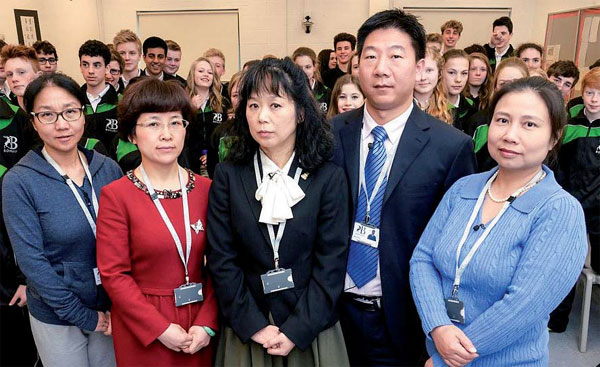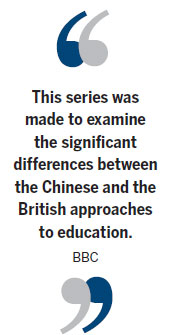School for thought
Updated: 2015-08-28 08:28
By Zhang Zhouxiang and Zhang Chunyan(China Daily Europe)
|
|||||||||||
|
The five Chinese teachers featured in the BBC documentary, Are Our Kids Tough Enough? Chinese School. Provided to China Daily |
Eventually some of the students accepted the Chinese style and reluctantly bid farewell to the Chinese teachers, even bursting into tears.
The program received high audience numbers. The first episode was watched by 1.8 million viewers, 8.6 percent of that night's total UK viewing audience.
It became a major topic on social media for over three weeks in both China and Britain.
Sam Bagnall, executive producer of the BBC documentary, says the program exceeded the producers' expectations as it triggered fierce debate on the different education systems among media and netizens.
According to the BBC: "This series was made to examine the significant differences between the Chinese and the British approaches to education. ... For several years some of the East Asian countries have beaten the UK on core subjects in international league tables, and we wanted to explore if their approach could be transferred to the UK classroom."
Discipline and hard work were the two main differences highlighted in the series.
According to a Twitter user: "British education has gone soft. Teachers are abused and students have no discipline. ... The public see it but the politicians don't." That comment received 5,693 "likes".
"I believe they (Chinese teachers) are right. The children are the products of three or four generations of people who have been supported by the welfare state in one form or another," another user says, receiving 3,116 "likes".
Some British people say the "Chinese school" doubled the time spent in class for only a 10-percent increase in results, emphasizing the importance of happiness and independent thinking to students.
However, Chu Yin, a Chinese citizen who is familiar with Chinese and Western education systems, writes in an article in Yanzhao Metropolis Daily, published in Hebei province, that the Western basic education system completes the process of social stratification unconsciously and gradually through the relaxed study progress.
"Western education looks very loose and happy, no pressures. Even some Chinese parents and children admire it," Chu writes, adding that Western children from rich families normally put more effort into study by going to private schools, something children from ordinary backgrounds can't do.
The Chinese education system gives people more opportunity to join the elite through discipline and hard work, Chu says.
Charles Law, an English teacher points out: "It's confusing to be told you are perfectly OK when the reality is that you need to improve to compete with your peers. Short term you might feel better. Long term you won't progress. It is far better to instil determination and perhaps set a long-term target (6 months) and make the necessary improvements."
Even with the huge differences that were shown in the program, many British netizens and viewers claim that the documentary reminded them of past school-days, as the discipline and some of the Chinese methods were present in the British education system decades ago, and still are at the private schools.
"That's not the 'traditional Chinese method'; it's the 'traditional method'. It's how I learned decades ago, and guess what? It worked. 'Discovery learning', or whatever you want to call it, hasn't reinvented the wheel," one netizen named Alfred Greengrass said during one British online debate, winning him 1,198 "likes".
Cat Smith, a British student, says in the UK's Open University online debate on the subject: "I think British students and state schools can learn a lot from the Chinese system." She added that her school has a lot in common with the Chinese system.
"In my experience, as I have attended many schools, it is the private schools that have these traditional rules in place to show respect to those above you and which have very set rules in place that do not tolerate any disrespect or behavioral problems," Smith says.
Joanna Dodd, director of a London-based PR group, has two adopted Chinese daughters both going to King's Rochester, an independent school in the south of England. The two girls, Wan Mae Dodd and Mei Dodd, are 13 and 10 respectively.
"Our school expects very good behavior: be on time for class; don't run in corridors, put your hand up to ask a question, hand your homework in on time, don't talk when the teacher is speaking to the class, mobile phones switched off during the school day," one sister says, citing the strict disciplinary requirements of the school.
Today's Top News
Xi meets with former KMT chairman
Migrants protest as Hungary shutters Budapest train station
China manufacturing PMI falls to 49.7 in August
Migrant trains reach Germany as EU asylum system creaks
Second homes in China need lower down payment
Chinese athletes win 9 medals at Beijing world championships
Houston physicist invited to view V-Day parade in Beijing
Journalist, securities regulatory official held for stock market violation
Hot Topics
Lunar probe , China growth forecasts, Emission rules get tougher, China seen through 'colored lens', International board,
Editor's Picks

|

|

|

|

|

|








